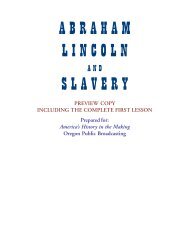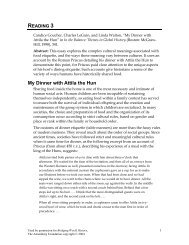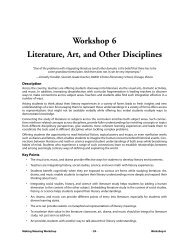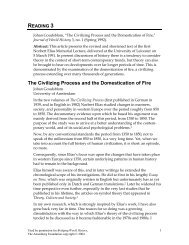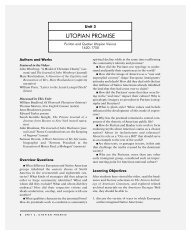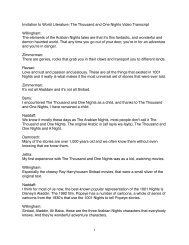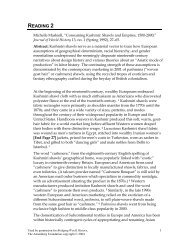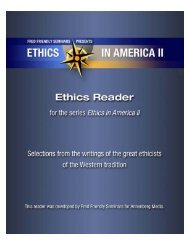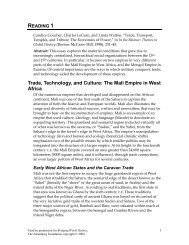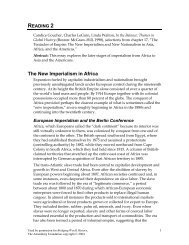Download Unit 8 Readings, Bureaucracy: A Controversial Necessity
Download Unit 8 Readings, Bureaucracy: A Controversial Necessity
Download Unit 8 Readings, Bureaucracy: A Controversial Necessity
You also want an ePaper? Increase the reach of your titles
YUMPU automatically turns print PDFs into web optimized ePapers that Google loves.
Humphrey’s Executor v. U.S., cont’d.<br />
methods of competition”—that is to say, in filling in and administering the details embodied by that general standard—the<br />
commission acts in part quasi-legislatively and in part quasi-judicially. In making investigations and<br />
reports thereon for the information of Congress under 6, in aid of the legislative power, it acts as a legislative<br />
agency. Under § 7, which authorizes the commission to act as a master in chancery under rules prescribed by the<br />
court, it acts as an agency of the judiciary. To the extent that it exercises any executive function—as distinguished<br />
from executive power in the constitutional sense—it does so in the discharge and effectuation of its quasi-legislative<br />
or quasi-judicial powers, or as an agency of the legislative or judicial departments of the government. [*]<br />
[p*629]<br />
If Congress is without authority to prescribe causes for removal of members of the trade commission and limit<br />
executive power of removal accordingly, that power at once becomes practically all-inclusive in respect of civil<br />
officers with the exception of the judiciary provided for by the Constitution. The Solicitor General, at the bar,<br />
apparently recognizing this to be true, with commendable candor, agreed that his view in respect of the removability<br />
of members of the Federal Trade Commission necessitated a like view in respect of the Interstate<br />
Commerce Commission and the Court of Claims. We are thus confronted with the serious question whether not<br />
only the members of these quasi-legislative and quasi-judicial bodies, but the judges of the legislative Court of<br />
Claims, exercising judicial power (Williams v. <strong>Unit</strong>ed States, 289 U.S. 553, 565-567), continue in office only at the<br />
pleasure of the President.<br />
We think it plain under the Constitution that illimitable power of removal is not possessed by the President in<br />
respect of officers of the character of those just named. The authority of Congress, in creating quasi-legislative or<br />
quasi-judicial agencies, to require them to act in discharge of their duties independently of executive control<br />
cannot well be doubted, and that authority includes, as an appropriate incident, power to fix the period during<br />
which they shall continue in office, and to forbid their removal except for cause in the meantime. For it is quite evident<br />
that one who holds his office only during the pleasure of another cannot be depended upon to maintain an<br />
attitude of independence against the latter’s will.<br />
The fundamental necessity of maintaining each of the three general departments of government entirely free<br />
from the control or coercive influence, direct or indirect, of either of the others has often been stressed, and is<br />
hardly open to serious question. So much is implied in [p*630] the very fact of the separation of the powers of<br />
these departments by the Constitution, and in the rule which recognizes their essential coequality. The sound<br />
application of a principle that makes one master in his own house precludes him from imposing his control in the<br />
house of another who is master there. James Wilson, one of the framers of the Constitution and a former justice<br />
of this court, said that the independence of each department required that its proceedings “should be free from<br />
the remotest influence, direct or indirect, of either of the other two powers.” Andrews, The Works of James Wilson<br />
(1896), vol. 1, p. 367. And Mr. Justice Story, in the first volume of his work on the Constitution, 4th ed., § 530, citing<br />
No. 48 of the Federalist, said that neither of the departments in reference to each other “ought to possess, directly<br />
or indirectly, an overruling influence in the administration of their respective powers.” And see O’Donoghue v.<br />
<strong>Unit</strong>ed States, supra., at pp. 530-531.<br />
The power of removal here claimed for the President falls within this principle, since its coercive influence<br />
threatens the independence of a commission which is not only wholly disconnected from the executive department,<br />
but which, as already fully appears, was created by Congress as a means of carrying into operation legislative<br />
and judicial powers, and as an agency of the legislative and judicial departments.<br />
In the light of the question now under consideration, we have reexamined the precedents referred to in the Myers<br />
case, and find nothing in them to justify a conclusion contrary to that which we have reached. The so-called “decision<br />
of 1789” had relation to a bill proposed by Mr. Madison to establish an executive Department of Foreign<br />
Affairs. The bill provided that the principal officer was “to be removable from office by the President of the <strong>Unit</strong>ed<br />
States.” This clause was changed to read “whenever the principal officer shall be removed [p*631] from office by<br />
the President of the <strong>Unit</strong>ed States,” certain things should follow, thereby, in connection with the debates, recognizing<br />
and confirming, as the court thought in the Myers case, the sole power of the President in the matter. We<br />
shall not discuss the subject further, since it is so fully covered by the opinions in the Myers case, except to say that<br />
the office under consideration by Congress was not only purely executive, but the officer one who was responsible<br />
to the President, and to him alone, in a very definite sense. A reading of the debates shows that the President’s<br />
illimitable power of removal was not considered in respect of other than executive officers. And it is<br />
pertinent to observe that, when, at a later time, the tenure of office for the Comptroller of the Treasury was under<br />
<strong>Unit</strong> 8 - 216 - Democracy in America





